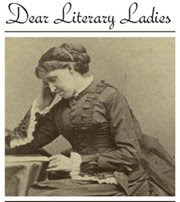
Dear Literary Ladies,
I write all kinds of non-fiction and I do enjoy it, but I can’t rest on my laurels until I take a stab at fiction. It’s fiction that seem to endure and make a lasting impression on culture. Or am I mistaken? Should I stick with writing about subjects I enjoy, or should I pursue the elusive dream of writing the Great Novel?
. . . I would ask you to write all kinds of books, hesitating at no subject however trivial or how vast. By hook or by crook, I hope you will possess yourselves of money enough to travel and to idle, to contemplate the future or the past of the world, to dream over books and loiter at street corners and let the line of thought dip deep into the stream. For I am by no means confining you to fiction. If you would please me—and there are thousands like me—you would write books of travel and adventure, and research and scholarship, and history and biography, and criticism and philosophy and science. By so doing you will certainly profit the art of fiction. For books have a way of influencing each other.
Fiction will be much the better for standing cheek by jowl with poetry and philosophy . . . Thus when I ask you to write more books I am urging you to do what will be for your good and for the good of the world at large.
— Virginia Woolf, A Room of One’s Own, 1929 .
Is it somehow nobler to write fiction than nonfiction?
Do I have enough wisdom to be a good writer?

Dear Literary Ladies,
Sometimes I feel that I don’t have enough life experience to be a good writer. Everything I write, in hindsight, looks rather shallow and inauthentic. Should I wait until I’ve lived more fully, and gain some wisdom, before I bare my soul to the public in writing, or should I just plow ahead?
I wrote “Their Eyes Were Watching God” in Haiti. It was dammed up in me, and I wrote it in seven weeks. I wish I could write it again. In fact, I regret all of my books. It is one of the tragedies of life that one cannot have all the wisdom one is ever to possess in the beginning. Perhaps, it is just as well to be rash and foolish for a while. If writers were too wise, perhaps no books would be written at all. It might be better to ask yourself “Why?” afterwards than before. Anyway, the force from somewhere in Space which commands you to write in the first place, gives you no choice. You take up the pen when you are told, and write what is commanded. There is no agony like bearing an untold story inside you.
—Zora Neale Hurston, Dust Tracks on a Road: An Autobiography 1942
How do you develop a unique writing style?

Dear Litarary Ladies,
How does one develop a unique writing style? I’m not an especially gifted wordsmith, so I thought if I came up with a style that sets me apart, I wouldn’t agonize so much over finding the time to hone my skills, or lack thereof.
I simply don’t believe in style. The style is you. Oh, you can cultivate a style, I suppose, if you like. But I should say it remains a cultivated style. It remains artificial and imposed, and I don’t think it deceives anyone. A cultivated style would be like a mask. Everyone knows it’s a mask, and sooner or later you must show yourself—or at least, you show yourself as someone who could not afford to show himself, and so created something to hide behind. . . You do not create a style. You work, and develop yourself; your style is emanation from your own being.
—Katherine Anne Porter
from Writers at Work: The Paris Review Interviews, 1963
How can I write without self-consciousness?

Dear Literary Ladies,
Now that my writing has seen the light of day, it’s hard to work without feeling like the public, the reviewers, my peers, and my editor are looking over my shoulder—all competing with the inner critic! How did you manage to work without self-cousciousness, knowing what's been said about how you could have done things better or differently?
Those critics or well-wishers who think that I could have written better than I have are flattering me. Always I have written at the top of my bent at that particular time. It may be that this or that, written five years later or one year earlier, or under different circumstances, might have been better for it. But one writes as the opportunity and the material and the inclination shape themselves. This is certain: I never have written a line except to please myself. I never have written with an eye to what is called the public or the market or the trend or the editor or the reviewer. Good or bad, popular or unpopular, lasting or ephemeral, the words I have put down on paper were the best words I could summon at the time to express the thing I wanted more than anything else to say.
—Edna Ferber, A Kind of Magic, 1963


